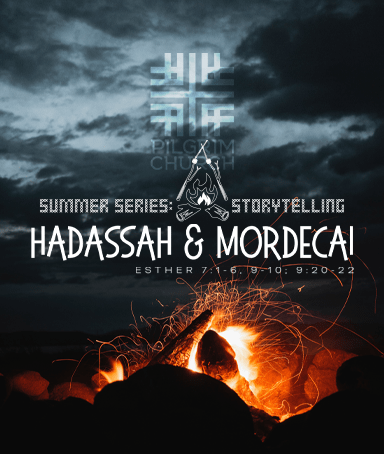TEACHING
|
Your browser does not support viewing this document. Click here to download the document.
|
SUNDAY, JULY 17, 2022
10:30 AM (kids + communion) SUMMER SERIES: Storytelling Hadassah & Mordecai, Esther 7:1-6, 9-10; 9:20-22 When do you want to just blend in—maybe in your days of youth or in your career? What if something happens to make you question the compromises you're making with yourself? All human relations call for compromise. The book of Esther contains an amazing story of assimilation, resistance, vengeance, violence, and uneasy victory. We enter the story that the Jewish holiday of Purim comes from to further understand why the church keeps this book in our collection of inspired texts.
SETTING
CHARACTERS
Those that have experienced being a minority, ethnic, religious, sexual, etc. can learn from this Jewish struggle throughout the ages. “Living as a minority community, dependent on the attitude and actions of the majority, has kept Jews always in a precarious position” (Eugene F. Roop, Esther, 161). TENSIONS? CONTROVERSY AND CONCERNS
B Esther becomes Queen + Mordecai saves the king [Esther 1:9-2:20 + 2:21-23] C Haman elevated to power [Esther 3:1-6] D Haman’s decree to destroy the Jewish people [Esther 3:7-15] E Esther and Mordecai’s plan to reverse the decree [Esther 4:1-17] F Esther’s first banquet + Haman plans Mordecai’s execution [Esther 5:1-8 + 5:9-14] X - PIVOT: Haman humiliated & Mordecai exalted [Esther 6:1-14] F’ Esther’s second banquet + Haman executed instead of Mordecai [Esther 7:1-10] E’ Esther and Mordecai plan to reverse the decree [Esther 8:1-8] D’ Mordecai’s counter-decree to save the Jewish people [Esther 8:9-14] C’ Mordecai elevated to power [Esther 8:15-17] B’ Queen Esther and Mordecai save the Jewish people [Esther 9:1-19] A’ Two feasts + The splendor of Mordecai [Esther 9:20-32 + 10:1-3]
TELLING AND ZOOMING IN Esther 7:1-6, 9-10; 9:20-22 (NET, 2ed): The King Has Haman Executed (New English Translation) 7 So the king and Haman came to dine with Queen Esther. 2 On the second day of the banquet of wine the king asked Esther, “What is your request, Queen Esther? It shall be granted to you. And what is your petition? Ask for up to half the kingdom, and it shall be done.” 3 Queen Esther replied, “If I have met with your approval, O king, and if the king is so inclined, grant me my life as my request, and my people as my petition. 4 For we have been sold—both I and my people—to destruction and to slaughter and to annihilation. If we had simply been sold as male and female slaves, I would have remained silent, for such distress would not have been sufficient for troubling the king.” 5 Then King Ahasuerus responded to Queen Esther, “Who is this individual? Where is this person to be found who is presumptuous enough to act in this way?” 6 Esther replied, “The oppressor and enemy is this evil Haman!” Then Haman became terrified in the presence of the king and queen. Esther 7:9-10 (New English Translation) 9 Harbona, one of the king’s eunuchs, said, “Indeed, there is the gallows that Haman made for Mordecai, who spoke out on the king’s behalf. It stands near Haman’s home and is 75 feet high.” The king said, “Hang him on it!” 10 So they hanged Haman on the very gallows that he had prepared for Mordecai. The king’s rage then abated. Esther 9:20-22 (New English Translation) 20 Mordecai wrote these matters down and sent letters to all the Jews who were throughout all the provinces of King Ahasuerus, both near and far, 21 to have them observe the fourteenth and the fifteenth days of the month of Adar each year 22 as the time when the Jews gave themselves rest from their enemies—the month when their trouble was turned to happiness and their mourning to a holiday. These were to be days of banqueting, happiness, sending gifts to one another, and providing for the poor. MEANING AND MESSAGE “...Esther cannot be read simply as a story of human foibles and political cunning (Clines, 1984a: 270). The narrative does not see the world as a place where God intervenes to reverse misfortune, nor as a place where God is absent or uninterested. In Esther, the drama of life is the realm where God's will works itself out in the course of human events and in cooperation with all those of goodwill" (Roop, 167).
RCL location: Esther 7:1-6, 9-10; 9:20-22; Proper 21 (26), Nineteenth Sunday after Pentecost, Year B {September 29, 2024). Sources: Feasting on the Word Commentary; Believers Church Commentary: Esther, E.F. Roop; Wikipedia: Esther; https://bibleproject.com/explore/video/esther/, https://bibleproject.com/blog/esther-secular-sacred/ ; NIVApp Commentary, Esther, Karen H. Jobes; Daily Bible Study, Esther, J.G. McConville; Others. |


